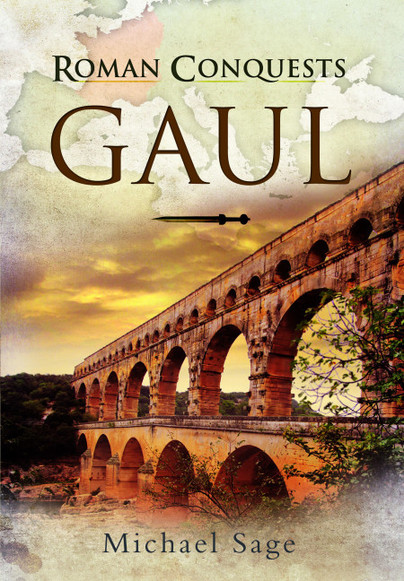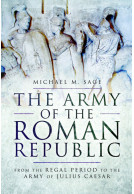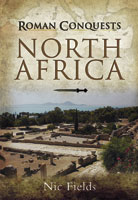Roman Conquests: Gaul (Paperback)
Imprint: Pen & Sword Military
Series: Roman Conquests
Pages: 224
ISBN: 9781399077323
Published: 16th August 2023
(click here for international delivery rates)
Order within the next 1 hour, 9 minutes to get your order processed the next working day!
Need a currency converter? Check XE.com for live rates
| Other formats available | Price |
|---|---|
| Roman Conquests: Gaul ePub (3.4 MB) Add to Basket | £6.99 |
Ever since their sack of Rome in the early fourth century BC, the various tribes of Gauls to the north were among the Roman Republic's most feared and respected foes. This book describes how Roman armies eventually carried war into their enemies' homelands and brought them into their expanding empire.
Michael M Sage relates the establishment of Rome's first footholds in Gallic territory, before moving onto Julius Caesar's dazzling seizure of all Gaul in the space of a few years. Caesar army repeatedly defeated much larger armies drawn from a fierce warrior culture. These, the most famous of all Roman campaigns of conquest, are described and analysed in great detail, as are the events of Vercingetorix's great rebellion which almost succeeded in throwing off Roman rule before it could be consolidated. Caesar's epic siege of Alesia provides a dramatic climax.
: Enhanced for the reader with the inclusion of a section of color plates and maps, "Roman Conquests: Gaul" also features a seven page Appendix (Development of the Roman Army of the First Century BC), nine pages of Notes, a nine page Bibliography, and a five page Index. "Roman Conquests: Gaul" is fascinating, informative, deftly organized and thoroughly 'reader friendly' in presentation. Originally published in hardcover in 2012, this new paperback edition is a solidly recommended pick for personal, professional, community, and college/university library Roman History collections and supplemental curriculum studies lists.
Midwest Book Review
Read the full review here
The narrative reads pleasantly and will be entertaining for anyone interested in the Celts or Romans.
www.hereditasnexus.com
An excellent introduction provides the background to the action of the book. Michael Sage has managed to narrate what is perhaps one of the most well-known of Rome's conquest, carried out by its most well-known conqueror, in a lucid yet adequately in-depth manner. Highly recommended to any reader of Ancient Warfare magazine.
Ancient Warfare
This is a useful entry in this series looking at one of the best known of all Roman Conquests.
www.historyofwar.org
Why did Julius Caesar cross the Channel from Gaul to invade England n 54 BC? Some historians say it was to prevent Kent tribes from going to Gaul to help fight the Romans. Others claim Caesar was lusting after British pearls. Michael Sage says that's rubbish. Caesar, he argues, made the crossing from Pas de Calais to Dover in order to boost his political standing back in Rome. He tells how Caesar almost ran into serious trouble when a sudden storm wrecked some of his invasion fleet and how he was impressed by the use of fighting chariots by the British Celts. Only one chapter of this book relates to Casesar's invasion of England, the rest, as the title suggests, concentrates on how he fought and eventually pacified the various tribes in Gaul. The French still celebrate the war Vercingetorix managed to unify the various tribes in Gaul and lead them in a war against Caesar. He is honoured in cartoon magazines and in exhibitions were his battles took place. His memory resurfaced during the German occupation in the Second World War to epitomise French resistance to an invader. In 52 BC Vercingetorix (his name means the Great King of the Brace) was defeated by Caesar in battle at Alesia (near Dijon), surrendered to him, and was taken to Rome where he was eventually executed. The book goes into previous battles between Caesar and the Gauls and how he made allies of some tribes which helped him to defeat others. He often treated his defeated enemies well but after one siege he ordered that all his opponents should have their hands chopped off.
Dover Express/Folkestone Herald Reviewed By Terry Sutton
About Michael Sage
Michael Sage is an emeritus professor and former head of the Department of Classics at the University of Cincinnati. He has also taught at the University of Waterloo in Canada and at the University of California at San Diego. He received his B. A. in anthropology and M.A. in history from the University of Michigan and his Ph.D. in Classics from the University of Toronto. He has published numerous articles and encyclopedia articles on many aspects of ancient history, including Roman imperial history and biography as well as ancient military history. He has also published books on St. Cyprian, the third century AD bishop of Carthage, on the Roman historian Tacitus and on Greek as well as on Greek and Roman warfare.






















